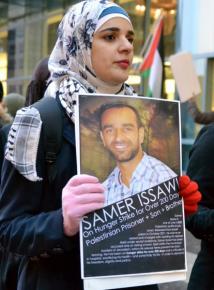Standing for those who can’t
reports on a protest for Palestinians imprisoned under Israel's apartheid.
SOME 25 pro-Palestine activists from an array of student groups, including Students for Justice in Palestine, Queer Alliance, MEChxA and the Black Student Union, marched on April 17 to Sproul Plaza at the University of California (UC) Berkeley to support Palestinian Prisoners Day, an annual event dedicated to the--as of now--4,713 prisoners being held in Israeli jails.
The students rallied to demand the release of Samer Tariq Issawi, who had been on hunger strike since August 2012, and the thousands more who have unjustly imprisoned as a result of Israeli apartheid. As of this writing, it has been announced that Issawi will, in fact, be released to his home in Jerusalem in eight months, after reportedly agreeing to end his hunger strike in exchange for a reduction in his sentence and an early release.
Participants focused on the plight of Issawi, who the Israeli army arrested in 2002 during the Second Intifada. He was eventually convicted of membership in an illegal organization (the Democratic Front for the Liberation of Palestine), possession of explosives and attempted murder.

In October 2011, he was released, along with 1,027 Palestinian prisoners, before being re-arrested in July 2012. Army prosecutors continue to withhold the details of why he was arrested from Issawi and his lawyers.
Issawi had been on hunger strike since August 2012 for eight consecutive months (250 days), and physicians said they were worried about the state of his heart. Doctors also warned about the possibility of brain damage, as well as partial failures of Issawi's lungs and kidneys.
The Israeli Prison Service denied a request by Physicians for Human Rights to send an independent doctor to examine Issawi's medical condition.
ISSAWI IS only one of many prisoners illegally detained by Israel. In February, the number of Palestinian children detained in Israel aged 12-15 rose from 31 to 39.
According to the Defense for Children International-Palestine Section (DCI-PS), "Almost 60 percent of the 236 Palestinian child detainees of all ages have been unlawfully transferred to prisons inside Israel." The report provides the chilling details of these children's arrests, stating that some children were "arrested and detained during the recent protests in support of Palestinian prisoners on hunger strike."
In this context, speakers at the Berkeley rally denounced Israel's prison system and policy of displacement, with some drawing parallels to the colonization of the Americas by European powers and the displacement of indigenous peoples. "Here, as in Palestine, the Europeans looked across the sea at our land and declared it uninhabited," said Patricio Yrarrázaval, an activist with MEChxA.
Another pro-Palestine activist read a public letter issued by Issawi from his hospital bed in Kaplan Medical Center on April 9:
Israelis:
I am Samer Issawi on hunger strike for eight consecutive months, laying in one of your hospitals called Kaplan. On my body is a medical devise connected to a surveillance room operating 24 hours a day. My heartbeats are slow and quiet and may stop at any minute, and everybody, doctors, officials and intelligence officers are waiting for my setback and my loss of life...I'm looking for an intellectual who is through shadowboxing, or talking to his face in mirrors. I want him to stare into my face and observe my coma, to wipe the gunpowder off his pen, and from his mind the sound of bullets, he will then see my features carved deep in his eyes, I'll see him and he'll see me, I'll see him nervous about the questions of the future, and he'll see me, a ghost that stays with him and doesn't leave.
Issawi's deteriorating condition comes on the heels of the death of Palestinian prisoner Maysara Abu Hamdiyeh, who succumbed to cancerhttp://www.guardian.co.uk/world/2013/apr/02/palestinian-prisoners-israe… April 2.
Abu Hamdiyeh, who was sentenced to life in 2002, had been diagnosed with cancer of the esophagus several months after complaining of ill health. By the time he was finally transferred to a hospital, his cancer had spread to his spinal cord, and he had already lost a considerable amount of weight.
Israeli authorities did little to help Abu Hamdiyeh, who was treated only with painkillers, according to his lawyers.
Palestinian prisoners called a three-day hunger strike in response to Abu Hamdiyeh's death. Israeli prison guards used teargas against protesting prisoners to try and break the strike. Similar clashes occurred in the West Bank city of Hebron, where Abu Hamdiyeh lived.
The issue of prisoners' rights has widespread resonance in Palestinian society, where most families have relatives in jail. On April 17, thousands of Palestinians declared a hunger strike of their own
in support of Prisoners Day.
"It is necessary to pressure Israel to release the Palestinian prisoners and hunger strikers," said Abdallah Abu Rhahmeh, a spokesperson for the Popular Struggle Coordination Committee, which helped organize the protests.
For pro-Palestine activists at UC Berkeley, Prisoners Day was especially significant, as the Associated Students of the University of California (ASUC) student senate prepared to vote on the question of divestment from companies profiting from human rights abuses and the displacement of Palestinians in Israel.
The bill, SB 160, passed 11-9.
For many protesters, the fight to free Palestinian prisoners is linked to the ongoing struggle for boycott, divestment and sanctions. Chants of "United voices for the land, liberate the shackled hands," and "From the river to the sea, Palestine will be free!" rang out across Sproul Plaza.


